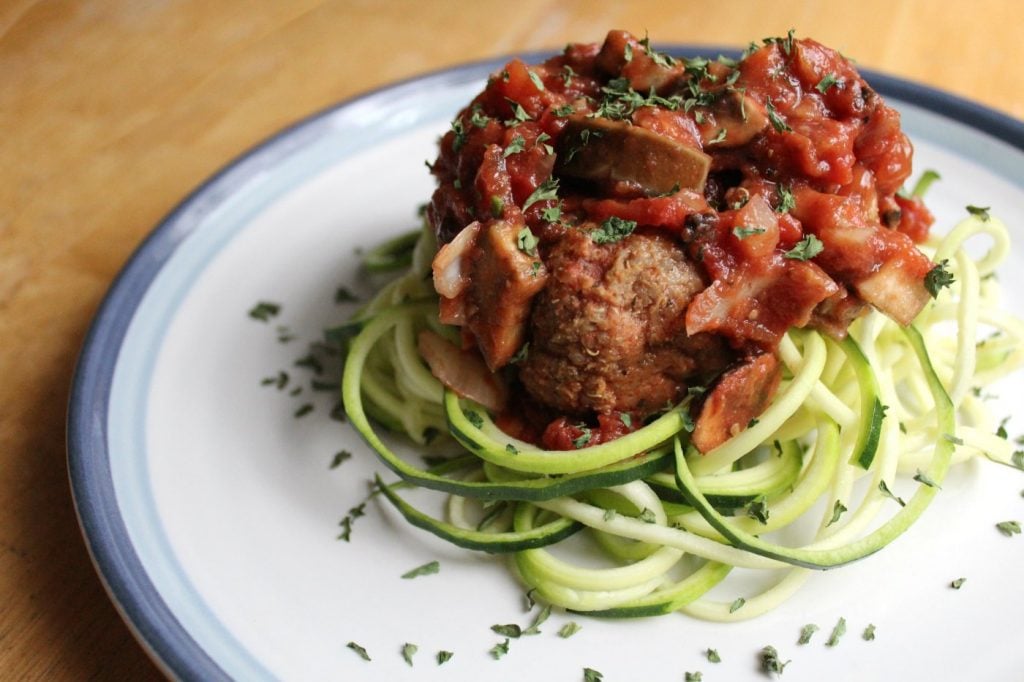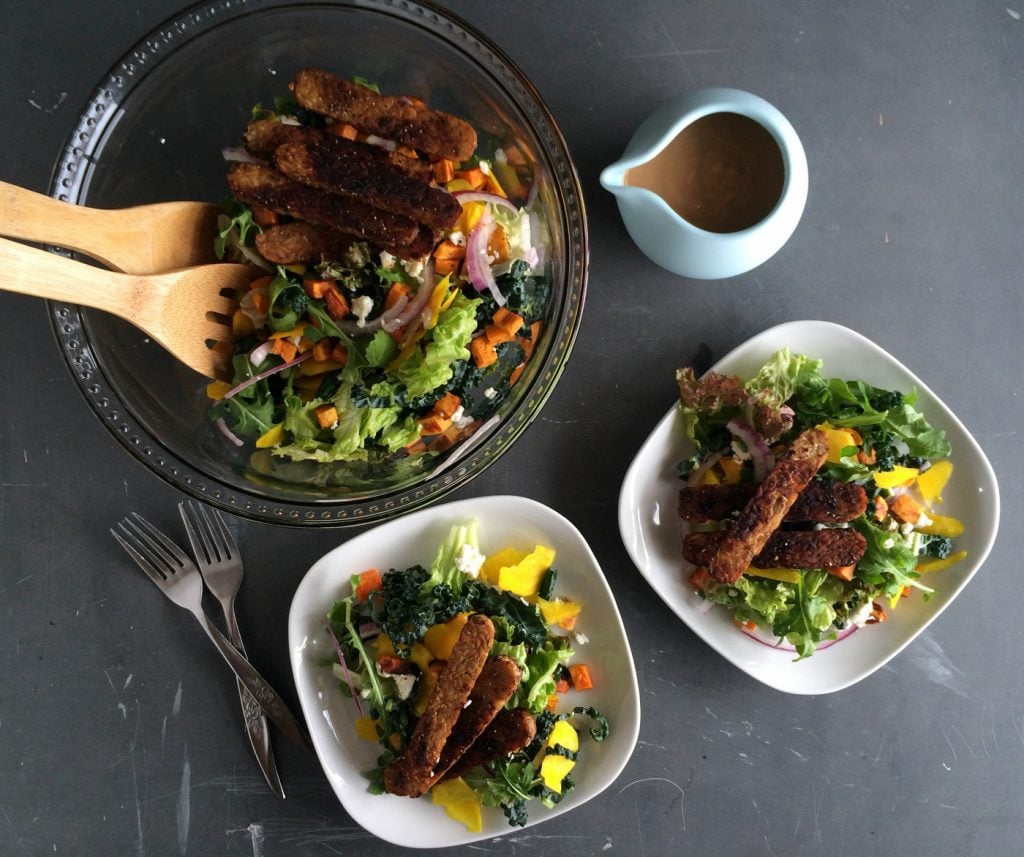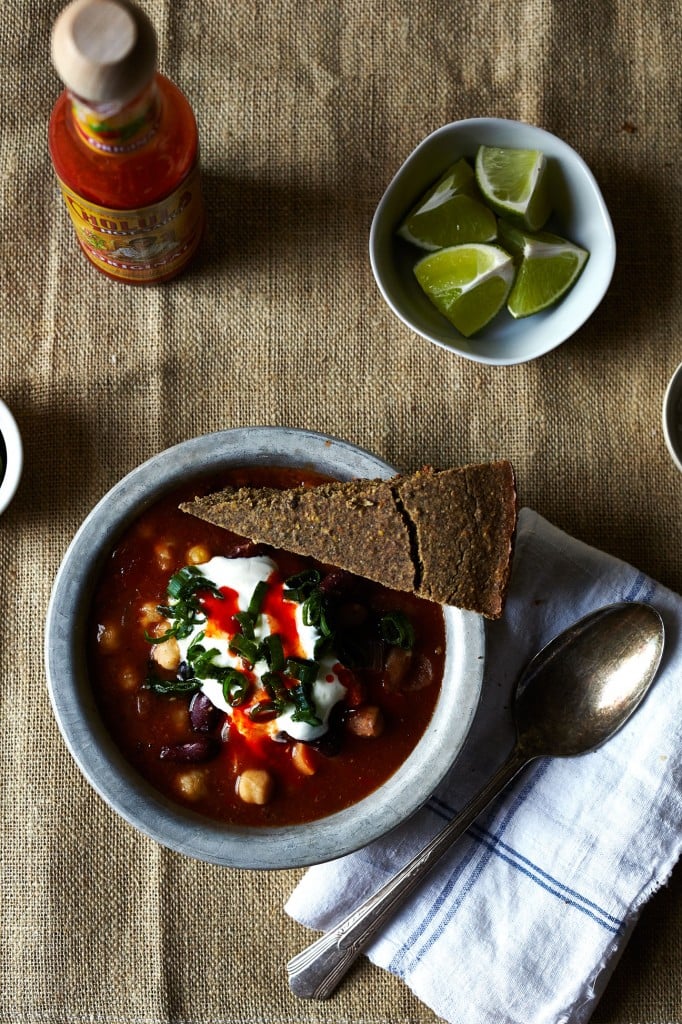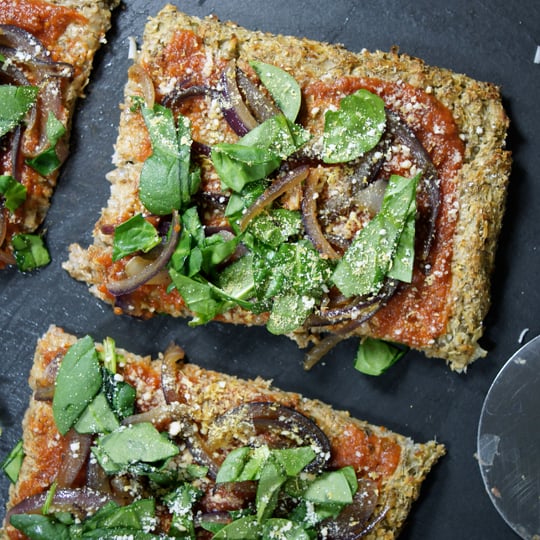Happy Saturday, friends. If you happen to be reading in the DC area, I hope you’ve been enjoying this wave of springtime weather! It’s lovely outside today. Here are some links that have piqued my interest this week.
To start things off, this lentil quinoa meatball bolognese over zucchini noodles looks like a fantastic combination of refreshing and hearty.
I’m still on a tempeh high from this week’s tempeh chili. This salad recipe–roasted sweet potatoes, greens, and tempeh sticks with barbecue balsamic dressing–looks like a perfect way to continue celebrating one of my fave vegan proteins.
Speaking of chili? Julia of Sassy Kitchen has far outdone herself with this bowl of vegan chili (served with buckwheat cornbread–not vegan, but veganizable fo sho).
This year’s food blogosphere trend seems to be cauliflower pizza crust. The reason I have not tried this creation is that these crusts almost always feature eggs. Now Megan has created a vegan version of cauliflower crust. Nice work, Megan!
And let’s end things on a sweet note, right? Richa’s brown rice pudding with banana and walnuts looks phenomenal.
Reads
1. This week, Marion Nestle covered Brazil’s new dietary guidelines. These are intended both to help protect against malnutrition and also to prevent obesity, which is steadily climbing in the country. The guidelines emphasize whole foods, eating in company, avoiding unnecessary fat and sugar, and being critical of food advertisements. They are pretty awesome. As Nestle notes, “Now if only our Dietary Guidelines Advisory Committee would take note and do the same?”
2. I’m sure that many of you saw this article already, but if you haven’t, it’s an interesting read. The author assesses how many foods currently sold at Walmart would be banned from Whole Foods, based on that store’s “unacceptable ingredients” policy. As it turns out, a whole lot–about 54%. There is of course some question about why and how Whole Foods decides which ingredients are acceptable and which aren’t. But even so, this is yet another expose of how many additives and various forms of refined sugar sneak into conventional processed foods.
3. A video about empathetic responses (including reassurance) among elephant herds. Too sweet, and such clear evidence of the emotional sophistication of these beautiful (endangered) creatures.
4. I am just about in love with Richard Gunderman’s article about burnout among doctors, residents, and medical students. Gunderman, a physician and educator, believes that burnout manifests itself in “high rates of emotional exhaustion, depersonalization, and a diminished sense of personal accomplishment.” He goes on to address the issue with empathy and a keen understanding of contemporary medical training. If this isn’t enough, he presents one of my favorite novels, Middlemarch, as a potential balm for the burned out young medical professional (and here the former English major and aspiring health care professional in me meet excitedly).
Lydgate, one of the principal characters in Middlemarch, arrives in the small British town after which the book is named to found a charity hospital. Over time, however, he drifts from his original intentions, turning his practice and research to gout (a disease of the wealthy), rather than typhus. “Though outwardly successful,” Gunderman writes, “he comes to see himself as a failure. In short, he burns out because he loses his way. To paraphrase the novel, Middlemarch not only swallowed Lydgate whole. It assimilated him very comfortably.”
On first glance, reading a gargantuan 19th century novel may not seem like a useful solution to professional exhaustion or disillusionment. But given that this burnout grows out of a system that will be slow to change, if at all, I think that turning to art is perhaps the most reasonable recourse possible for the medical student or doctor who is distressed. What’s more comforting when things are tough than to be reminded that our experiences are not unprecedented, or to see our struggles reflected through another person’s imaginative and insightful vision? Gunderman ends by saying,
Everyone needs to make compromises, but such compromises should not come at the cost of abandoning core aspirations. Quite the reverse, the primary goal should be to allow such aspirations to develop and express themselves in the challenging world of contemporary medicine. Books like Middlemarch are no panacea, but they offer precisely the imaginative nourishment so often missing from contemporary medical education, a powerful antidote to the insidious forces that produce burnout.
5. An interesting article about how certain patterns of abnormal brain activity might predispose certain people to eating disorders. The idea that there might be neurological underpinnings to disordered eating is not new, but our understanding of the interplay between brain activity and diseases like anorexia and bulimia remains limited. I always welcome news of research like this, and believe that it has the potential to help a lot of people.
Speaking of eating disorders: National Eating Disorder Awareness (NEDA) week begins on Monday. As always, I have some thematically appropriate posts planned for the week ahead, including a great green recovery submission. That said, I do want to know if you all have any particular topics you’d like me to address? I asked on Facebook, and so far there seems to be a lot of interest in orthorexia. So, let’s put that on the agenda.
Any other ideas? Leave a comment or email me (gena@thefullhelping.com). I’d love to know what’s on your mind.
xo
You might also like
For all of my (probably very irritating) talk lately about how much I heart winter, I can’t say that it wasn’t a joy to wake up this morning, step outside, feel the sun on my face, and realize that it was nearly 70 degrees in New Orleans. I’m here in Crescent City visiting my bestie, Chloe, and her husband, Knud. My trips here are always really special–not only a chance to spend quality time with people I love, but also a chance to…
Happy weekend, friends! I’m writing the gorgeous city of Chicago, where I’m here to co-present a study abstract that I co-authored with the gastroenterologist I work for at Digestive Disease Week. It’s been 24 whirlwind hours of endoscopy demos and biliary disease and other such topics. While I prep for our poster talk, here are some of the recipes and articles that caught my eye this week. Hannah Kaminsky does it again with this whimsical, playful, and absolutely beautiful endive, artichoke and strawberry…
Happy Friday, friends. As you settle into your weekend, here’s a little reading material for you. 1. Delicata Squash Butter from Helyn of Helyn’s Healthy Kitchen looks like a scrumptious alternative to almond or pumpkin butter. 2. This Cranberry Walnut Chickpea Salad Sandwich from Julie of the Simple Veganista looks filling and tasty. 3. Janet’s Pan-Roasted Cauliflower Steak is, like all of her recipes, creative and lovely. 4. I’ve been on a soup kick since the rutabaga and parsnip concoction I posted yesterday,…
Q: Gena, where were you all weekend? A: Mad busy! But I missed you all so much, and it feels great to be online again. Thanks to any and everyone who chimed in on my last post. What a smart and nuanced collection of musings on the value of raw foods and raw foodism! I wanted to mention that the blogger who wrote the post that originally inspired mine also wrote a smart and thorough response to me this morning. In it, she…







Leave a Comment
Whoa, those meatballs in the first recipe looked like a dead ringer for actual meat at first–I had to click through and check the recipe. Love that cauliflower pizza crust too!
You always find such interesting articles. I hope that elephant study gets a bit more publicity and people take note that these beautiful animals are really just like use humans.
Looking forward to reading what you have to say about orthorexia. Eating disorders often overlap to some extent, at least in my case I imagine I had orthorexic tendencies combined with anorexia, but orthorexia in isolation is not something I’m that familiar with.
And I love Middlemarch too by the way!
Hi Gena-I would love to see you address binge eating disorder as well. I know you’ve touched on it a few times, but I never feel that it gets enough press. Also, if you could perhaps speak about some of your experiences or concretely what’s helped you overcome your own struggles with ED-how to eat based on hunger, how to eat ‘normally,’ I would find that really helpful. Thank you for increasing awareness concerning these topics!
thank you so much for the recipe shout out! what a wonderful list of recipes and reads!!
Jaime, I love the recipe. Thanks for letting me share.
Hi Gena, I saw you mentioned body dysmorphia in the comments, and as someone who struggles with this more acutely than anything else, I’d love for you to write about this issue next week. xo Molly
Molly,
Sure. I’ll do my best to incorporate it!
xo
Hi Gena!
Thanks for another great round up! I truly look forward to these every week. I can’t wait to check out the article about Wal-Mart. I love their organic produce but rarely buy anything else. I can’t wait to enlighten myself:) Whole Foods is my weekly go-to because I can shop there with full trust and know my money is going to the best use possible.
Also, I love the last item you shared about neurological studies on eating disorders. I participated in a study that NEDA featrued on their website last year about a genetics study with UNC Chapel Hill on eating disorders and genetics. I can’t wait to get the results back when the study is over in 5 years. I KNOW based on my lifelong history with anorexia and orthorexia the last 10 years that it has to be genetically related, along with neurologically. I’ve had neurological issues since I was a child, with seizures in my teens, despite being a straight A student, and incredibly book smart. I’ve also always been a perfectionist, and drawn inward with a natural “people pleasing” character since I was a child. I can remember being as small as 6 years old in dance class comparing my body to other girls, and as young as 8 hating it. My parents praised me for years, so how does that happen if neurological and genetic issues don’t play a part? I feel for sure it does. I can’t imagine it not seeing how the brain is such a complete complex part of our bodies and controls everything we think, say, feel, and do.
I would love to see you cover an article on orthorexia too, as Rebecca from Strength and Sunshine mentioned. She and I have a good bit in common, and orthorexia is the most prevalent issue I’ve dealt with the last 10 years and one I still struggle with. Part of me believes it is better than starving or binging, though I know this is disordered thinking on its own. I do feel it’s so important to live a conscious, healthy life though, due to the way the food industry markets food as healthy when it isn’t. It’s a very complex issue, and sometimes I wonder if orthorexia is a term coined for being extremely aware, despite that it seems disordered and at my core, I know the last 10 years of my life have been. I’ve dealt with many aspects of orthorexia and consider myself well past initial recovery, but know I may never reach a full ” eat whatever you want when you want” stage. I think it would make a great topic to cover!
Have you read the book “Answers to Anorexia”? It’s a new one I was referred to from a friend. It covers actual nutritional deficiencies that have been linked to anorexia sufferers and these deficiencies have been proven to cause the disorder. I haven’t read it yet, but can’t wait. I heard it’s a real page turner, so I thought I’d ask.
Sorry for the long comment! Just so many thoughts on a great Weekend Reading post:)
Enjoy your weekend<3
XoXo
Heather
Thank you for so much for the book recommendation, Heather. At first glance, I wonder if the “nutritional deficiency” theory might provide clues as to why “green recovery” has been at least partially effective in managing ED symptoms for many of us. (Excited to read re. this compelling approach to treatment!)
What Karen said 🙂
Heather, yes, thanks for suggesting that book! It looks fascinating. I’ve certainly heard from people in the field that “re-feeding” is basically what treats anorexia, or at least its main psychological symptoms. But of course re-feeding varies a lot in quality of nutrition, and absorption is an issue. In terms of causing the disorder, it’s well understood that starving people develop the symptoms of AN, and that many of the symptoms are likely “state” not “trait.” I think the problem with this interpretation has been that even after re-feeding, many people relapse and/or continue to experience significant body dysmorphia and psychological symptoms. So- are those the people who remain nutrient deficient, for whatever reason? Karen I totally agree that green recovery focuses on nutrient quality and might be a major reason why it’s so helpful for many people. I’m going to look more in the literature and see whether this has been done (nutrient levels and prediction of relapse).
Right, Laura! Anorexia – and ED’s into which it often later morphs – is incredibly complicated and multifaceted. From my experiences, I can already conclude – even before reading the book – that eating a nutrient dense diet isn’t a magic cure or even the foolproof solution to managing symptoms. Yet, I am always curious to read innovative theories on this ever-baffling disease, esp. when they seem to at least partially corroborate the underpinnings of my own successes in long term management of ED related behaviors. Best to you.
I’m looking forward to reading about orthorexia! I always try to speak about NEDA on my college campus.
One topic I think would be interesting is where unhealthy eating patterns bleeds into eating disorders. So often I see my peers over eat or splurge, then punish themselves with overt exercise and cycles of dieting and restriction, only to feel deprived and over eat again. While this isn’t healthy behavior, I think it’s common among young women and brings a lot of them shame and feelings of anxiety related to food. I don’t know if it’s classified as disordered eating but it definitely has components.
Really interesting topic, Ellie — thank you for suggesting it!
An interesting article on eating disorders, but words I find hard to hear. Like you, I think I do “love to eat” so reading articles that say that people with anorexia don’t respond to sugar and/or don’t feel hunger/satiety makes me feel like a “failure” and an illegitimate sufferer. My struggles at the moment are around very clearly HEARING my body’s signals and desires, yet not being “allowed” to respond to them in a very punitive way by her voice. If you have any thoughts…
I hope I haven’t shared too much for the comments thread…
h x
I understand why you’d feel that way, Hannah, and am sorry to hear you had that reaction to the article. I don’t have the same response, because I don’t think that this one study purports to describe *all* eating disorders, or claim that some are more legitimate than others. It’s just trying to account for what might be true for *some* people who are suffering. Rare is the medical finding that applies to every single person with a particular condition, right? And as long as it might provide more insight into some peoples’ struggles, I’m excited to hear about it and hopeful that it might help them.
For my own part, while I do think that my response to food is as intense/pleasurable as anyone else’s (possibly more intense than some), I find it totally plausible that more investigation into brain activity and EDs might shed light on my own experience. Perhaps, for example, it might help me to better understand a long and persistent history of body dysmorphia? Who knows. In any case, while I don’t think any study can provide answers for everyone, I think more information is always valuable.
SO true, and please don’t think I was criticising you sharing the article, I was just sharing my view. I have plenty of friends who do fit this description, who do seem to be distanced from food in a way I certainly am not, and of course I want research that helps EVERYONE. One of the hardest things about mental illnesses though is that everyone’s experiences are so different – unlike eg. a broken leg, where everyone’s experience and treatment will be much the same…
I agree, Hannah. And in my experience, people with EDs often struggle with feelings of “illegitimacy” about their suffering (as well as shame/embarrassment) so of course this kind of research may strike that chord. Thanks for sharing your response 🙂
*due to
Laura, thank you for elucidating that article with your expertise and professional experience! It’s tremendously helpful to those of us who aren’t entirely literate in these kinds of studies.
Hannah, I have a similar personal response to this research. However, as someone with experience in this kind of research, I can think of other interpretations for the finding. For example, the “yum food tastes good” response might be just as strong, but might be numbed or “turned down” by parts of the brain that are reacting negatively- “no I shouldn’t do this” or “oh no I ate food.” The anterior insula integrates signals related to food and reward and bodily states and receives input from numerous other brain areas, so it is quite possible that the dampened response is, at least in some individuals, do to a more conflicted enjoyment of food, rather than a different taste-processing of the taste stimulus per se.
Great list..I bookmarked half the recipes and all the articles. I know whatever you write for NEDA week will be thoughtful and articulate. Can’t wait to read.
🙂 Thank you — I can’t wait to write.
Thank you so much Gena for sharing my recipe! I feel so honored for a vegan genius like you to spotlight it 😉
I think it would be a great idea to discuss orthorexia on the blog. I suffer with a disorder relationship with food and it falls under the orthorexia rader.
Oh goodness! No genius here. Thanks so much for letting me share your lovely recipe. And I’m happy that the orthorexia topic strikes a chord (though of course sorry that it strikes a chord, since that means you’ve suffered with it). I’m glad to be addressing it.
As a second year med student, I love that your articles always cover the spectrum of medicine and nutrition. I just participated in a study through Duke University aiming to reduce burnout among medical professionals; it’s a subject matter that definitely hits close to home. Great weekend reading posts as always!
It always makes me happy when med students read and engage! Thanks for sharing, Sarah. Glad you liked the article.